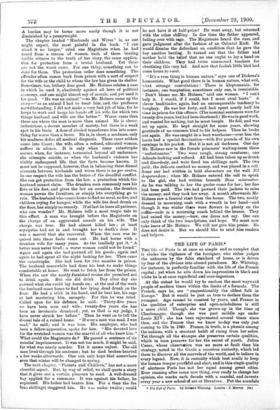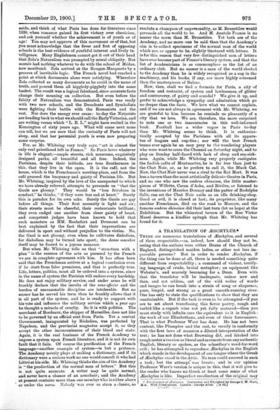THE LIFE OF PARIS.*
• The Life of .Parts. By Richard WI:aging. London: J. Murray. [61.1
THE life of Paris is at once so simple and so complex that it eludes the vigilance of the foreigner, who either judges the unknown by the false standard of home, or is driven by fear of the obvious into absurd paradoxes. Mr. Whiteing, for instance, is perfectly familiar with the life of the French capital ; yet when he sets down his impressions in black and white he is at once superficial and over-ingenious.
At the outset he would try to enclose the most wayward people of modern times within the limits of a formula. The French, says he, are "unquestionably the oldest folk in Europe." But it would be just as true to declare them the youngest. Age cannot be counted by years, and France in the qualities of enterprise and open-mindedness is still a mere child. Though she was grown-up in the time of Charlemagne, though she was past middle age under Louis XIV., she has been rejuvenated several times since then, and the France that we know to-day was only just coming to life in 1800. France, in truth, is a phcenix among the nations, with a constant habit of rising from her ashes. Yet through all the shanges she preserves certain qualities, which in turn preserve for her the secret of youth. Julius Cwsar, whose observation was no more at fault than his strategy, noted in the Gauls a ceaseless curiosity, which led them to discover all the marvels of the world, and to believe in every legend. Now, it is curiosity which best avails to keep the human temper youthful and alert, and in this single quality of alertness Paris has not her equal among great cities. Ever running after some new thing, ever ready to change her opinion, she marks each decade with a scandal, and invents every year a new school of art or literature. Put the scandals aside, and think of what Paris has done for literature since 1830, when romance gained it first victory over classicism, and ask yourself whether the achievement is of youth or of age! You may not approve of *hi movement or of that, but you must acknovrledge that the fever and fret of opposing schools is the best evidence of youthful interest and lively in- telligence. Many Englishmen cannot get it out of their head that Zola's Naturalism was prompted by nibral obliquity. But morals had nothing whatever to do with the school of Medan, now moribund. Zola arrived at the Rougon-Macquarts by a process of inevitable logic. The French novel had reached a point at which documents alone were satisfying. Wherefore Zola collected as many documents as he could in the name of truth, and poured them all higgledy-piggledy into the same basket. The result was a logical falsehood, since accurate facts change their meaning on collection. But even before the falsity of Naturalism was demonstrated, Paris was ready with two new schools, and the Decedents and Symbolists were fighting their battle with the Romanists and the rest. Nor does the energy ever cease: to-day the Naturists are heading back to what we should call the Early Victorian, and are writing verses which "L. E. L." might have recited in the Kensington of sixty years ago. What will come next none can tell,-but we are sure that the curiosity of Paris will not sleep, and that her perennial youth is even now preparing some surprise.
For, as Mr. Whiteing very truly says, "art is almost the only real priesthood left in-France." So Paris loves whatever in life is elegant, —ample streets, rich museums, exquisitely designed parks, all beautiful and all free. Indeed, the Parisians, despite their latitude, are true Southerners in this, that they live in the open. It is the cafe, not the house, which is the Frenchman's meeting-place, and from the cafe proceed the buoyancy and gaiety of Parisian life. But Mr. Whiteing, inspired by the love of the unexpected to which we have already referred, attempts to persuade us "that the Gauls are gloomy." They would be "less frivolous in conduct," he thinks, "if they were less sad at heart." Surely this is paradox for its own sake. Surely the Gauls are gay before all things. Their first necessity is light and air; their streets must be cheerful, their restaurants brilliant; they even cudgel one another from sheer gaiety of heart, and competent judges have 'been known to hold that such monsters as MM. Rochefort and Drnmont can be best explained- by the fact that their imprecations are delivered in sport and without prejudice to the victim. No, the Gaul is not gloomy, even when he cultivates diabolism, for diabolism may be turned into sport; the dense macabre itself may be footed to a joyous measure.
But when Mr. Whiteing tells us that "structure with a plan" is the essence of the arts as pursued by the French we are in complete agreement with him. It has often been said that the Frenchman arrives at a logical conclusion even if he start from false premisses, and that is perfectly true. Life, letters, politics, must all be ordered into a system, since in the name of system the Parisian will endure every hardship. He does not enjoy military service, and under arms he will frankly declare that the insults of the sous-officier and the burden of unreasonable discipline are intolerable. But no sooner has he served his term than he frankly allows that it is all part of the system, and he is ready to support with his vote and influence the military service which a year ago he thought a miracle of cruelty. So it is with politics. The merchant of Bordeaux, the shipper of Marseilles, does not like to be governed by an official sent from Paris. Yet a central Government, inaugurated by Richelieu, was perfected by Napoleon, and the provincial magnates_ accept it, as they accept the other inconveniences of their blood and state. Again, it is the real business of the French Academy to impose a system upon French literature, and it is not its own fault that it fails. Of course the purification of the French language—another example of system—is but a pretence. The Academy merely plays at making a dictionary, and if its dictionary were a serious work no one would consult it who had Littreat his side. Mr. Whiteing thinks the aim of the Adademy is "the production of the normal man of letters." But this is not quite accurate. A writer may be quite normal,. and never have a chance of an armchair; and the Academy at present contains more than one member who is either above or under the norm. Nobody was ever so stern a classic, so
resolute a champion of impersonality, as M. Brunetiere would persuade all the world to be. And. M. Anatole France is no nearer the norm than M. Brunetiere. Yet both are of the Academy, and no more :can be said than that the Academy's aim is to collect specimens of the normal man of the world which are, or appear to be, slightly tinctured with letters. It is for this reason that very few distinguished men of letters have ever become part of France's literary system, and that the list of Academicians is as commonplace as the list of an ordinary club. But no sooner is a man of the world elected to the Academy than he is widely recognised as a cog in the machinery, and his books, if any, are more highly esteemed than the masterpieces of Balzac.
How, then, shall we find i formula for Paris, a city of freedom and restraint, of system and lawlessness, of glitter and controversy, of gaiety and scandal P We give it up, and prefer to acknowledge a sympathy and admiration which go no deeper than the facts. We love what we cannot explain, and if we are not always in agreement with Mr. Whiteing, we are grateful to him because he reminds us pleasantly of a city that we love. We are, therefore, the more surprised to note one or two inapcura.cies in this well-informed book. Football has a wider vogue in Paris to-day than Mr. Whiteing seems to think. It is enthusias- tically accepted by the Parisians with all its appara- tus of leagues and cup-ties ; nor will the best French teams ever again be 'an easy prey to the wandering* players who were wont to cross the Channel on Saturday night, and to play on Sunday half-dazed with lack of sleep and sea-sick- ness. Again, while Mr. Whiteing very properly castigates the foolish cafes of Montmartre, he is far less than just to the Chat Noir, or, as he prefers to call it, the Black Cat. Now, the Chat Noir never was a rival to the Rat Mort. It was less a tavern than the most artistically delicate theatre in Paris, and no one who saw the ambres chinoises, the little master- pieces of Willette, Caran d'Ache, and Riviere, or listened to the inventions of Maurice Donnay and the patter of Rodolphe Sails, can set the Chat Noir aside as an idle drinking-shop. Good or evil, it is closed at last; its proprietor, like many another Frenchman, died on the road to Moscow, and the famous ombres chinoises did their host turn (let us hope) at the Exhibition. But the whimsical tavern of the Rue Victor Masse deserves a kindlier epitaph than Mr. Whiteing has found for it.



































 Previous page
Previous page